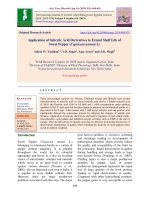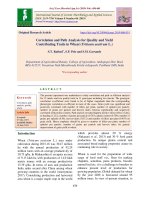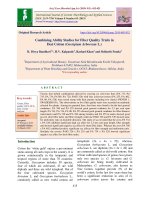Graphical analysis for quality traits in sweet pepper (Capsicum annuum L.)
Bạn đang xem bản rút gọn của tài liệu. Xem và tải ngay bản đầy đủ của tài liệu tại đây (176 KB, 4 trang )
Int.J.Curr.Microbiol.App.Sci (2019) 8(5): 2355-2358
International Journal of Current Microbiology and Applied Sciences
ISSN: 2319-7706 Volume 8 Number 05 (2019)
Journal homepage:
Original Research Article
/>
Graphical Analysis for Quality Traits in Sweet Pepper
(Capsicum annuum L.)
Baseerat Afroza, S.H. Khan, Azra Lateef* and Labiba R. Shah
Division of Vegetable Science, Sher-e-Kashmir University of Agricultural Sciences and
Technology of Kashmir, Shalimar-191 121, J&K, India
*Corresponding author
ABSTRACT
Keywords
Capsicum annuum
L., Diallel,
Graphical analysis,
Quality traits
Article Info
Accepted:
18 April 2019
Available Online:
10 May 2019
An investigation was carried out with ten diverse genotypes of Sweet
pepper (Capsicum annuum L.) and forty five F1 crosses generated from
them through 10 x 10 diallel mating design. Through Vr-Wr graphs, it was
found that moderate to high amount of diversity was present in the
genotypes with respect to the quality traits under study as depicted by the
positions of parental arrays in the Wr-Vr graphs. The regression line
intersecting the Wr axis below the origin for most of the traits indicated
over dominance. Position of the parental arrays on the graphs indicated the
importance of both dominant and recessive alleles for the traits under study.
At present, the sweet pepper cultivars
available for commercial cultivation are either
poor yielders and/or with low nutritional
quality. This necessitates the development of
varieties/hybrids superior in both yield and
quality. Hence there is a need to have
knowledge on the nature and magnitude of
various genetic parameters operative in
different characters. This information is of
immense importance for selection of best
genotypes
and
appropriate
breeding
procedure.
know the nature and magnitude of gene
effects for expression of traits. Diallel
analysis allows understanding genetic control
of the trait, which helps the breeder to
advance and select segregating populations.
There are several approaches available for
analysis of diallel crosses but the two main
approaches being followed are Griffing’s and
Hayman’s approaches. These approaches
have been successfully used by various
scientists in peppers (Sousa and Maluf, 2003;
Geleta et al., 2006; Sujiprihati et al., 2007;
Rego et al., 2009; Kamble et al., 2009;
Grajales et al., 2009; Daryanto et al., 2010).
Several biometrical procedures are available
for evaluation of parents and their crosses to
In addition to this, the Wr-Vr statistic
calculated from diallel tables, provides an
Introduction
2355
Int.J.Curr.Microbiol.App.Sci (2019) 8(5): 2355-2358
estimate of the relative number of dominance
to recessive genes present in the common
arrays of the parents. The graphs can be
drawn for these statistics which can
subsequently be interpreted.
Materials and Methods
The experimental materials for the present
investigation consisted of ten diverse
genotypes of Sweet pepper (Capsicum
annuum L.) viz., SP-4, SP-21, SP-29, SP-31,
SP-32, SP-82, SP-202, SP-614, SP-640 and
California wonder (Check) and forty five F1
crosses generated from them through 10 x 10
diallel mating design. The experimental
materials were evaluated at three locations
viz.,
Vegetable
Experimental
Farm,
SKUAST-K, Shalimar; Krishi Vigyan
Kendra, Malangpora and RRS & FOA
Wadura. At each location the experiment was
laid out in completely randomized block
design with three replications. Recommended
package of practices were adopted to raise a
healthy crop at all the locations.
Results and Discussion
The pooled Wr-Vr graphs are presented in
figures 1. Graphical analysis for all the
quality traits under study revealed that some
of the parental arrays were clustered around
the regression line and some were scattered,
indicating the presence of little to moderate
amount of genetic diversity among the
parents.
Fig.1
Total chlorophyll (mg/100g)
T.S.S oBrix
Vitamin C
Total carotenoids
2356
Int.J.Curr.Microbiol.App.Sci (2019) 8(5): 2355-2358
The intersection of regression line with the
Wr axis below the origin revealed over
dominance for T.S.S. and total carotenoids.
The regression line was found to intersect
the Wr axis above the origin for total
chlorophyll and vitamin C indicating partial
dominance.
melhoramento genetic. Vicosa: UFV
390 p
Daryanto, A., Sujiprihati, S. and Syukur, M.
2010. Studi heterosis dan daya
gabung Karaker agronomi cabai
(Capsicum annuum L.) pada
persilangan half diallel. Journal
Agron. Indonesia 38: 114-121
Geleta, L.F., Labuschagne, M.T. and
Maryke, T. 2006. Combining ability
and heritability for vitamin C and
total soluble solids in pepper
(Capsicum annuum L.). Journal of
Science Food Agriculture. 86 (9):
1317-1320.
Grajales, M.P., Hernandez, V.A.G., PennaLomdi,
A
and
SahangienCastellanos, J. 2009. Combining
ability and heterosis for fruit yield
and quality in manzano hot pepper
(Capsicum
pubescens
R&P)
landraces. Revista Chapingo Serie
Horticulture 15 (1): 47-55.
Hussain, K., Khan, S. H., Parveen, K.,
Afroza, B., Makhdoomi, M.I.,
Mushtaq, F. and Nazir, G.2017.
Graphical Analysis for Quality Traits
In Brinjal (Solanum melongena L.).
Economic Affairs 63:1-4
Kamble, C., Mulge, R. and Madalageria,
M.B. 2009. Combining ability for
earliness and productivity in Sweet
pepper (Capsicum annum L.).
Karnataka Journal of Agricultural
Sciences 22 (1): 151-154
Ramalho, M.A.P., Santos, J.B. and
Zimmermann, M.J. 1993. Genetica
quantitative em plantas autogamas,
Goiania: UFG, Pp-271
Rego, E.R., do Rego, M.M., Finger, F.L.,
Cruz, C.D. and Casali, V.M.D. 2009.
A diallel study of yield components
and fruits quality in chilli pepper
(Capsicum baccatum). Euphytica
168:275-287
Sousa, J.A-de and Maluf, W.R. 2003. Diallel
The parents placed closer to origin suggests
that these parents carry more dominant
alleles, the parents clustering near the Wr-Vr
axis intersection indicate the presence of
both dominant and recessive alleles in the
inheritance of the trait, while as the parents
lying farthest indicate the presence of more
recessive genes. For all the quality traits
under study, the parents were positioned
away from the point of origin indicating the
importance of both dominant and recessive
alleles for the expression of these traits. For
total chlorophyll, the parents P2, P3 and P6
being farthest exhibited importance of
recessive alleles. For T.S.S., the parents P3,
P5, P7 and P8 were lying farthest from the
origin depicting the role of recessive alleles.
The intermediate positions of rest of the
traits depicted the contribution of both
dominant and recessive alleles. For vitamin
C, the parents P1, P6 and P8 exhibited role
of recessive alleles being placed farthest.
Rest of the parents exhibited the role of both
dominant and recessive alleles. For total
carotenoids, the parents P1, P5, P7 and P8
were lying far away from the point of origin
indicating the contribution of recessive
alleles. For rest of the parents, disparities
were observed for the presence of dominant
and recessive genes. Similar results have
also been reported by Sousa and Maluf
(2003) and Hussain et al., (2017) for various
traits in hot pepper.
References
Cruz., C.D., and Regazzi, A.J 1994.
Modelos biometrics aplicados ao
2357
Int.J.Curr.Microbiol.App.Sci (2019) 8(5): 2355-2358
analysis and estimation of genetic
parameters of hot pepper (Capsicum
chinense Jacq.) Scientia Agricola 60
(1):105-113.
Sujiprihati, S., Yunianti, R., Syukur, M. and
Undang 2007. Pendugaan nilai
heterosis dan daya gabung beberapa
komponen hasil pada persilangan
How to cite this article:
diallel penuh enam genotype cabai
(Capsicum annuum L.) Bul. Agron.
35: 28-35
Vencovsky, R., and Barriga, P. 1992.
Genetic
biometric
no
fitomelhoramento. Ribeirao Preto:
Sociedada Brasileira de Genetica.
Pp-496.
Baseerat Afroza, S.H. Khan, Azra Lateef and Labiba R. Shah. 2019. Graphical Analysis for
Quality Traits in Sweet Pepper (Capsicum annuum L.). Int.J.Curr.Microbiol.App.Sci. 8(05):
2355-2358. doi: />
2358



![Studies on correlation and path analysis for grain yield and quality components in foxtail millet [Setaria italica (L.) Beauv.]](https://media.store123doc.com/images/document/2020_01/09/medium_dyd1578574836.jpg)

![Genetic parameters for grain yield and nutritional quality traits in foxtail millet [Setaria italica (L.) Beauv.]](https://media.store123doc.com/images/document/2020_01/13/medium_tvq1578927783.jpg)



